 United States Elgar, Prokofiev, Walton: Behzod Abduraimov (piano), Cleveland Orchestra / Vasily Petrenko (conductor). Mandel Concert Hall at Severance Music Center, Cleveland, 1.12.2022. (MSJ)
United States Elgar, Prokofiev, Walton: Behzod Abduraimov (piano), Cleveland Orchestra / Vasily Petrenko (conductor). Mandel Concert Hall at Severance Music Center, Cleveland, 1.12.2022. (MSJ)

Elgar – Cockaigne Overture (‘In London Town’), Op.40
Prokofiev – Piano Concerto No.2 in G minor, Op.16X
Walton – Symphony No.1 in B-flat minor
Some orchestral works are indestructible, while others very much depend on persuasive presentation. Sir William Walton’s First Symphony is such a piece, one where the complexities and ambiguities can clot into self-consciousness if performed in a low-energy manner. For that reason, it is not a piece I would want to hear led by certain conductors. But when I saw that Vasily Petrenko would be doing it in this visit to the Cleveland Orchestra, I had high hopes of a committed performance.
The hopes were well-founded. Petrenko continues to impress in his visits here, which have included impressive performances of Elgar, Rachmaninoff, Prokofiev, Bartók and more. He is not the figure one immediately thinks of with Cleveland, which is known for its patrician reserve. But the contrast between the ensemble’s poise and Petrenko’s fire makes for a best-of-both-worlds blend, and this concert was one of his best yet.
It opened with a delightful account of Elgar’s Cockaigne Overture, another work that succeeds when the conductor keeps its episodes focused. Petrenko did that, but what is so exciting is that he has a way of finding the music’s emotional feel without losing that forward momentum. It is still a bit startling to hear a Russian conductor with such an idiomatic mastery of an English composer, but Petrenko has it. In his hands, Cockaigne had plenty of high spirits, yet wistfulness was never far away, and behind that lay Elgar’s darker shadows, only fleetingly glimpsed. Petrenko’s ability to convey this makes him one of the best Elgarians in the business today.
The energy turned up to eleven on a scale of one to ten when Behzod Abduraimov joined for Prokofiev’s Piano Concerto No.2. The piece starts with deceptive calm, but it wasn’t long before the piano passages bloomed into dissonant thickets. Abduraimov tore into it like a man possessed, fearlessly wrangling the difficulties while never forgetting to caress its rare moments of softness. Petrenko and the orchestra backed him to the hilt.
This was Abduraimov’s first performance downtown after a strong debut at the Blossom Festival in 2021. He is a formidable pianist, but to show that he also has a sense of humor, he played Tchaikovsky’s ‘Neapolitan Song’ from the Children’s Album with a witty, breakneck coda. How he could play that flurry of notes after the demands of the Prokofiev is beyond me. He must have fingers of steel.

After the intermission came the Walton, with Petrenko savoring the music’s considerable twists and turns. It is a work that I have had some doubts about in less energized performances, but Petrenko threw himself into it with abandon. At the same time, he kept the long arc of the music in mind, giving Walton’s adventures a long-term shape.
Despite his fire, Petrenko did not drive the orchestra mercilessly, allowing key solos such as Frank Rosenwein’s oboe to bloom over the first movement’s underlying nervous energy. Particularly of interest (and a key part of the long arc) was the sense that Petrenko had thought through the harmonic progressions of the music and chose which notes to emphasize in Walton’s tonal but thorny chords. The waspish second movement was exhilarating, though the timpanist got a bar behind in the closing lash. It’s unfortunate, but it happens. I would rather hear the occasional mishap than be at a safe performance which risks nothing.
The slow movement built steadily to its intense, unresolving peak, the strings digging in deeply. One of the most famous challenges is the finale, which almost completely abandons the ambiguities of the increasingly dark preceding movements in favor of a breezy brightness. This reflects the gap of a year during the work’s composition, and Walton’s change of mindset after beginning a new relationship.
Some performances try to make the finale fit better by pacing it broadly and underplaying its high spirits, but that only hamstrings the entire piece. Instead, Petrenko took Walton at his word and played it fast and buoyantly. It works this way because of the reflective passage near the end that summons up memories of the work’s earlier troubles, followed by an almost agonizing climb to the peak of the mountain in the coda. It came off brilliantly and was received with elation by the audience.
Petrenko is becoming a favorite guest in Cleveland, along with Jakub Hrůsa and Stéphane Denève, all of whom enrich the orchestra’s silvery sound with richer colors. The latter two bring boldness and warmth, respectively, but Petrenko is the Prometheus of the bunch, bringing finely controlled fire.
Mark Sebastian Jordan

Great review. I traveled from NYC to hear this program. I concur with everything you say. The orchestra is magnificent and Vasily Petrenko one of the most exciting conductors before the public today. One thing I would add, Jessica Sindell’s flute solos in the slow movement of the Walton were seraphim, with exactly the right sound quality and gorgeously phrased. It was worth traveling just to hear those!